|
Gamer Forge Listener Email: Name Calvin Garcia Comment In the D&D group I play with one of the players insists that when you reach a new level you have to zero your experience. However when I checked the PHB1 there is no reference to this. PHB1 uses the term Total Experience when talking about leveling up. Which is correct? Gamer Forge Response: Say, whaaaat? DCR says: No. no, & no. Your friend is either severely misinformed, or feeding you a line. Experience points (XP), is a progressive jackpot. It would take forever to gain levels if your XP total reset each time you "ding". Hence the term, "grinding". Gamer Forge Listener Email:
Name Steven Cowan Comment When in Ravenloft, would the town in question know that the Dark Lord is indeed, say, a vampire? That he or she would be the real ruler of that Domain? For example: Barovia. Strahd has been there for a long, long, very long time. How do the villagers see him? Simply an undying ruler (if a ruler at all)? For what he is, a powerful vampire? The real ruler of Barovia? His castle… simply a haunted castle that's been there since the beginning of Barovia? Or that the Castle Ravenloft is the home of the Vampire Dark Lord? I guess it could vary from DM to DM, but I have always wondered how would you explain it. Are the people in each domain in denial, would they know by now, etc.? Gamer Forge Response: We have no witty segue into this one. DCR says: 1. What's the alternative? Maybe the citizens put up with a vampire lord because the surrounding area is at least ten times worse than in the domain of the castle. You head into the surrounding countryside and you are threatened with death all day, every day. While the land around the castle is, at the very least, protected. Thus, the villagers put up with the occasional abduction/sacrifice. 2. Again, the alternative: maybe the villagers are totally okay with their undead ruler. Maybe the town sees the need to give up one of the town's virgins to ensure the safety of the rest of the population. Who knows? Maybe the vampire offers excellent health insurance and a 401k. So where does this leave the heroes? This idea might be best left for when you're ready to throw a curve ball at your players. 3. The easiest thing to take into account would be time frame. What point on the timeline will your heroes be making their appearance. If they are early in the canon, then maybe the villagers don't know for sure what rules Castle Ravenloft. Later on, you can easily justify the townsfolk knowing more about what goes on up there. Your heroes might not be the first heroes to show up... Gamer Forge Listener Email: Name School Teacher [email protected] Comment Dear Dungeon Crawlers Radio, I work with students that have a lot of difficulty performing roles that benefit the group as a whole. Their mentality is that they all want to be the winner or at least play the most important part, and so they struggle with the fact that everyone is important and plays a role in success for the group. I am asking here because my knowledge of any kind of RPG where roles are assigned and must be performed is extremely limited. Any help would be greatly appreciated. I have 10 year-olds, usually 8-10 of them. Fantasy is fine, but probably need to stay away from demons and black magic. My initial thought that started this was an economy type rpg. What I'm really looking for is a game where the students are required to perform a role that differs from everyone else's, and if they don't perform it well (as in trying to do someone elses "job") they fail as a group. Thank you, Gamer Forge Response: Hmmmmm....DCR says: 1. Try splitting the class into groups of no more than four, then give each group a choice of character to which the group decides actions. Then, the whole class becomes a controlling interest in the party, and every important decision is made by the class and success/failure rests on the students. Pre-generated characters will most likely serve you best, but at least consider letting the groups generate a character. That way they make more decisions regarding the outcome. No, seriously. Use the link above. It's free and saves you a bunch of time. 2. This isn't tee-ball! If you enter with the mentality that failure cannot happen, for whatever reason, then you are depriving your student of the most important life lessons. Namely, coping with failure. Ideally, the students will succeed and the adventure continues. We say, make a big deal about the big decisions, and if the "character" doesn't quite succeed, make it light hearted, move on quickly, and bring the focus back to the story, not on the failure. Trust us, the students will feel it, and internalize those feelings. But they must learn to cope with the failure, not just success. 3. Don't get too mundane. Its a good opportunity to incorporate lessons on economy and the barter system. Just remember not to let mundane events become the focal point of the game. *Bonus XP: If you need a more educational reference about antagonists and how they rule, remember that during the American Revolution (you know, the one that made the United States of America), good people still supported England, even though they colonists hated being taxed like they were. Not necessarily out of loyalty, but because England was still trying to take care of it's colonies. Sure, it wasn't exactly a bang-up job, but what do you expect from an Empire that was growing too large to manage.
0 Comments
On this week's episode of "The Gamer Forge"... Gamer Forger Listener Email: Name King In Need Comment I'm running a D&D 4e campaign. IN the game a player has worked very hard and somehow tricked me into becoming a king of an evil kingdom. Good for him he deserves it. However, how do I keep him from: 1.Going into his towns treasury and looting all the gold and buying everything in the D&D manual. 2.Rolling his army out to do quests for him. Furthermore, how do I challenge a king intellectually and in battle. A personal army would be very annoying for me to maintain and or fight. Imagine rolling 20 times per turn. Any thoughts at all would be appreciated. Gamer Forge Response: Confuscious says: "A king in need is a king who isn't very good at PR". When you hand the keys to the kingdom over to the player, DCR says... 1. Just because its listed in the book, doesn't mean the players have access to it. Take into account geographic, political, and economic boundaries when determining what players have access to from vendors. The new king may have enough money to buy a ballista that shoots whales, but if you're not near an ocean, then you can't have it. 2. The game of politics becomes a story in and of itself. This new king now has to deal with political coups, assassination attempts, bribery, and romantic triangles as a matter of course. If the player wishes to still have the keys to the kingdom, then make these the new "normal". If, after a while, the player doesn't like these story arcs, then make him relinquish control of the throne. Give him/her a fair chance to back down, because he/she may have bitten off more than they chew. 3. If it all seems like too much, then make the player also handle all the mundane tasks of managing his kingdom. It's kind of a dick move. No, it's actually a big dick move, but you do what you gotta do to keep the action of the game moving. Treat it as SimCity: Home Edition. If the player was smart enough to get the keys, then he should be smart enough to take care of the car. Turnabout is fair play. Gamer Forger Listener Email: Name Maverick Johnsen Comment Right now, three of my party's members are afflicted with the paranoia insanity. One effect is that paranoid characters cannot willingly accept aid, including healing, without making a Will save against the insanity DC. However, things don't play out as I expected, in-game: 1.the paranoid cleric will cast a cure spell on a paranoid PC. 2.The paranoid PC will attempt a will save to accept healing and fail, as per the insanity's effect. 3.the paranoid PC then argues that they should get a saving throw against it, because the cure spell is harmless. But by failing, the PC 'suffers' the effects of receive the cure spell. My problem is that this approach seems to reward PCs who have low Will saves by having a failure on the spell's saving throw become a success for them. Is this just how it is, or are we handling this scenario wrong? Gamer Forge Response: The saving throw vs. a saving throw against another saving throw makes a saving throw? We spent more time figuring out the wording than we could find an answer. DCR says: 1. Too much dice rolling. Cut it down to one saving throw to keep things moving. This paranoia is making things much too complicated and stalling things out. 2. The easy way to answer this is to ask: "what are you saving against?" If you, the controlling player, wish to receive something like healing, then you must resist the influence of the mental state. This is one of those times where one must turn off the "meta-game". 3. Also, phrase your questions better, please. We have to be able to understand what it is you are asking so we can actually provide an effective answer. Otherwise, you are wasting your time, and ours. Thank you. *Bonus XP: For a more in-depth look at what happens when politics become super convoluted and dramatic, take a look at any point in the television show, 24. Next, start moaning about the scene with the mountain lion. Then, play your game as the king of your evil kingdom, and worry about Jack Bauer coming for you, because that's what he does. Congratulations! You successfully became the villain of your own game!
 Gamer Forger Listener Email: Name: Sam Hutchinson Comment: I've got a character who needs more melee weapon damage. What kind of things can you do to increase the damage? Gamer Forge Response: When it comes to putting that extra force behind your swings, DCR says: 1. A nasty combination of getting a ridiculously high melee damage output would be combining the feats Improved Initiative, Death Blow, and Improved Trip, along with a weapon called a Ghost Head Broadsword, can raise your muscle to its upper limits. Improved Trip states that a successful trip attempt results in the character NOT having used the attack action for the trip attempt. Death Blow states you can make a coup de grace as an attack action, not a full-round action. The GHBS features a 1d10 damage with a times 3 critical multiplier and an 18-20 critical threat range. So, quick math reveals (1d10+STR+magic+feats) x 3 x (z) = OMG! Where z=number of attacks per round. A coup de grace is considered an automatic critical hit. Who says junior high math doesn't pay off? Another option requires a significant purchase or, alternatively, a great deal of looting. The epic items, Gauntlets of Relentless Might, and Headband of Perfect Excellence should get you licking your chops. The Gauntlets give you a boost of +6 to STR and CON, while the Headband give you a whopping +6 to STR, CON, and WIS. Great for monks! Because, twinking your characters, that's why. ....and players wonder why some of this stuff didn't transfer from one edition to the next. Gamer Forger Listener Email: Name: Louis Christie Comment: The Player's Handbook states that you can get "bonus spells" for certain ability scores, but does that mean more spell slots/spells per day, more spells known, or both? Gamer Forge Response: Can you spell slots? Get it? Spell? Slots? Yeah, us neither. DCR says: 1. Bonus spells gained through a high attribute do NOT grant additional spells known. Only spells per day. A "wizard" can know any number of spells that they have in their spell book, but only that many. They can't spontaneously know more. Conversely, a sorcerer has innate knowledge of spells, but cast via force of personality, not knowledge. Making a sorcerer smarter won't change anything. Also, bonus spells also doesn't grant you access to spells of levels you don't know yet. Example: a first level wizard who has bonus spells up to third level, doesn't start off knowing third level spells. Once they can cast a third level spell (at level 5, if memory serves), then they can utilize the bonus spells (per day) for their high intelligence score, thus casting more spells per day than the standard wizard. ...again, none of this grandfathered in to the fourth edition. Gamer Forger Listener Email: Name: George Stevenson Comment: A lot of the time I find that my players are using their knowledge about the game to there characters advantage even when the character would have no way of knowing certain information. Here is an example. Trolls do not regenerate when struck by acid or fire damage. A lot of times I find that my characters always carry around a vial of acid or a fire spell just in case they meet a troll. When they have never faced a troll ever in the life of their character. Another example would be when the characters find a portal that is blood red, a player will say, "That portal will take us to the Abyss!!" and BAM the surprise is gone. There's more but I'm not going to make a huge list of examples. I mean I'm really glad that my players take the time to read up on this stuff but sometimes it ruins the suspense and belief of the game, I mean how would a half Orc barbarian know that a certain marking on a wand means its a Wand of Burning Hands? My question is this: How do you get players to use character knowledge instead of player knowledge? Gamer Forge Response: The ultimate thin red line between playing and cheating: metagaming. DCR says: 1. Describe monsters as if you don't know what it is. A very common (and very easy) pitfall of gaming is players like to spend time immersing themselves in the lore of the world in which they play. It isn't good or bad, it's just something everyone does. Counterbalance this by no longer assigning the common name for the enemy the first few times they encounter it. Don't call a "gnoll" a "gnoll". Getting the players in the spirit of the world starts with the Dungeon Master getting in the spirit of the world. However, once the characters have been around for a while and survived a good deal, it's cool to let them know aspects of creatures, especially commonly encountered creatures. 2. If you feel that the metagaming crosses the line into cheating, the next step is to not let the players assume the have the advantage. Remember the old adage about "assume"? It makes an "ass" out of "u" and "me". The moment someone makes the assumption they have the advantage, they will behave as if they do. Another easy pitfall. At the early stages of the game, players assume they know exactly how to entice the goblin king out of its cave? Put the kibosh on that by saying, "Roll me a (insert relevant lore check here), please." If they succeed reasonably at the check, then they can know some of the information on the goblin. Otherwise, they don't know, and can respond with something like, "Find another option, please." Certain aspects of logic are enforceable! 3. You will never fully be able to curb it. You can't make players forget what they learned about the game unless that player is Homer Simpson, or you have a fondness for causing head trauma. But we don't judge, either way. *Bonus XP: Still feel like you're not doing enough melee damage? Try this little tidbit: the D&D 1st edition rules on an assassin sub-class allow for a special attack that can kill an enemy outright, regardless of how many hit points they have. The player has a percentage chance, based on level, of successfully using the attack. Even better, if the attack fails, he/she still deals normal sneak attack/backstab damage. A little house rule can transfer this into a more current rule system. The assassin starts with a small percent chance of killing the target, say 25 percent. Then every other level thereafter, that percentage goes up. So, around 10th level, they may have a 50 percent chance of assassinating the enemy. Now, if that doesn't whet your appetite for destruction, then maybe you start seeing a shrink. Just saying.  Gamer Forger Listener Email: Name Dixon Michaels Comment Hello Dungeon Crawlers Radio! What can I say, but I think I royally screwed up my game. Let me kind of explain what’s happened. So my group has been playing for over a year now and they are roughly about level 11. So they are well established characters that have the means or taking care of themselves in almost any situation. The party is a group of five, including a rogue, mage, cleric, and two fighters that can really dish out the damage. They work together really well. So they have accepted a quest to retrieve the fabled item of Rovak and during the quest was able to piece together the clue to bring them to the cave of a long dead Dragon, Golfinix. The enter the cave and clear it out with ease, but when they arrived in the chamber where the item was rumored to be they found a half eaten and bloated body of a Drow upon the floor. Now the Drow have not been seen in this year for several decades so this was a great surprise to the characters and so they wanted to investigate further but the Cleric reminded them of their responsibility to warn the surrounding villages and send a warning to the King. After this was done they searched out a fellow by the name of Cor’Valtis to learn of any possible Underdark passages that could possible come close to or connect with the dead Dragon’s lair. When indeed Cor’Valtis identifies such one passage they party takes off after the foul elves. Now this is where things basically go wrong. The players find the small cave begin their progress down into the Underdark. Now because only one of them is a Dwarf and the rest are Humans they are basically blind unless they use their items the produce light, sun rods, torches, or magical devices. The players didn’t think anything of this…But of course down in the Underdark they are a giant beacon of come get some! After several fights with some really nasty creatures the players barely make it near to the Dragon’s cave to find that the Drow had magically created a tunnel that connected to the passage and the cave. At that point they decided to follow the tunnel to a smallish cavern that housed a adamantine tower of some sort. Of course it was a trap because why? The Drow scouts had seen their light source and went to investigate. The group crossed the cavern with ease and no threats came at them, because the Drow were closing off any escape routes. The rogue easily picked the lock on the tower door and in went the group with weapons in hand. They had a small skirmish with a iron golem inside the entryway which was vastly much bigger on the inside than the tower would allow one to think. The battle was tough but they dispatched the golem. Once that was done they went to open the large doors that allowed them to move forward it was here that the rogue rolled a 1 and failed on disarming the trap, thus setting off an alarm and having his hand puncture by a misfiring spring. With the alarms going off the two fighter’s broke down the doors and proceeded to barrel into whatever was on the other side of the doors. 8 Drow with nasty swords and other weapons in hands. During the battle the rogue started to feel ill and faint and failed both saving throws and succumbed to the poison that was coursing through his veils that was on the spring. So she drops down to the floor unconscious, the Drow then focus their attacks on taking out the mage and the cleric. Which of course brought up some annoyance and heated words from my players saying the NPCs would not go after them since they are in the back. I again reminded them that these were thinking NPCs and not feral beasts or dumb goblinoids. With a few crossbow bolts coated with sleep poison and failed save throws the mage and cleric dropped to the floor out cold. The two warriors nearly dead were able to pull off a save and defeat the remaining Drow. The alarm is still ringing and they have only gone two rooms into the tower. One of the warriors when to take a peak outside and nearly got his head chopped off by a Drider before slamming the door shut and throwing down the locking bar. Now the PC’s are stuck, two asleep, and one dying of poison and the only person that could save him is asleep. I don’t want to bail them out because they have walked into this ill prepared and are level 11 characters. One of them may die as they have to move on. So really the question here is two part first I would like you to help put the argument to rest that the Drow would have tactically gone after the spellcasters in the group and not the stronger fighters first. Then secondly when should I do in regards to my players? Should I throw them a bone and a safe way out? If I do should there be some consequence to their actions? Because honestly I don’t think the Drow would just let this pass? Let alone what should the consequence be for failing to retrieve the item as promised? Can you help me out here! Dixon Gamer Forge Response: Drider? We hardly knew her! Har har! DCR says: 1. The easy one: Of course, the drow would target a cleric. The drow matriarchal society reveres clerics. Some surface-dwelling fools bringing their heretical beliefs to offend Lolth? Yeah. Provided your cleric is taking great pains to hide his cleric-ness(?), then the drow foes would know to target their efforts there, thus gaining a tactical advantage. 2. If, for some zany reason, your heroes escape this situation, don't go easy on them. The worst thing one can do for their players right now, would be to hand-wave or in any way gloss over the escape. At level 11, these characters have earned the privilege of getting the full details of their adventures. Now, the players have a few options. First, it's not out of the question to attempt to parlay. With circumstances being so dire, the two fighters may have to resort to this. Second, attempt to fall back and try again. Get some hirelings or mercenaries for some extra muscle. Lastly, you may have to surrender and negotiate the terms of your release. This may include having to do a favor for a matriarch. It will most likely be something that will kill you or compromise you. But, at least you will be out of this frying pan. 3. This part we can't stress enough: don't hammer down on them. These heroes have learned some of the valuable life lessons of adventuring, so there's no need to keep crushing their spirits by heaping on punishment after punishment. Sometimes, having failed at a quest is punishment enough. One or more of them may die trying to get out of this predicament. Telling the story of how they do it, and giving the details of the losses necessary to make it happen will be the true reward for your players. Just make sure you keep things moving. Don't let this little tragedy slow down the pacing of your game. *Bonus XP: You think things are pretty dire? Try reading Robert Heinlein's Starship Troopers. That's a pretty hopeless situation. Sure, soldiers get to ride around in robots, but a never ending mass of faceless, nameless killer spider/beetle things? The whole story is a satire, not unlike the movie Robocop. Coincidentally, both film versions were directed by the same guy, Paul Verhoeven. Weird, huh? But that says something about how players/viewers can handle the direness of the scene. No matter what the final outcome is, maybe it's best to look back with a smile and laugh at it. This scene has the makings of a great war story to tell the young ones when you become old geezers and tell them about what gaming was like when you only had a piece of paper and a pencil and a twenty-sided die, uphill...both ways! 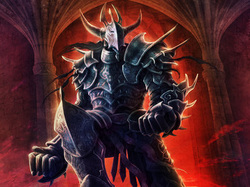 Gamer Forge Listener Email: Name Calvin MacDonald Comment Gentlemen and the lovely Firebird. I first want to say thank you for putting on such a great show. I've been listening t for the last year and I have to say you have had an amazing line up of guests! I'll be honest I don't get to see to many of the guest you've have on the show over here in Perth, Scotland. So with that said greetings from across the pond! And I'd like to know where Lord Flagoon has a plot oh land and when he plans to come across the pond and have a pint with us! And now for my gaming question. One of my players wants to play an unarmed fighter. What I need to know is; do spiked gauntlets count as weapons or as armor for the purposes of enchanting? I hope you can help me out and Lord Flagoon we'll always have a pint wait'n for yah! Gamer Forger Response: This one was easy. When you gotta have spikes on them fisteses, DCR says: Spiked gauntlets make you armed even when you aren't holding a weapon. When enchanting spiked gauntlets, they count as weapons, not armor. Enchant accordingly. Gamer Forge Listener Email: Name Jack Reynolds Comment My question is quick and simple. Could an undead in 3.5e D&D such as a skeleton benefit from wearing magic items like rings of protection? Gamer Forge Response: We don't always give our skeletons magic items, but when we do: Sure. Rings of Protection count as a deflection bonus, thus can stack with different bonuses that a skeleton or other undead may have. The only similar bonuses that stack are "dodge" bonuses. So a deflection bonus stacks with a natural armor bonus, which stacks with a luck bonus, etc., to calculate an Armor Class. Stay armored, my friends.  Gamer Forge Listener Email: Name Steven Rostenberg Comment Can a Rogue (D&D 3.5) use sneak attack on both the first and second attack? I know this seems like a question you can simply Google but the answers vary and my clan is under the impression that I can only use it on my first attack (once per round) and not on my second attack. From Googling, I've understood that as long as the monster / enemy is flat-footed, flanked or caught off-guard, I can apply sneak attack on both my first and second attack in a round. Is this correct? Is it normal if the clan simply decides that that gives me an unfair advantage in combat and gives me only one sneak attack per round? Gamer Forger Response: Sneaky, sneaky! When getting your sneak on, DCR says: 1. If for some reason you get multiple attacks, you get to apply the sneak attack bonus damage to each successful hit. Here's the justification: sneaky types (typically) aren't gonna be wielding the large weapons and (usually) don't have access to powers and special abilities that enhance their normal damage output. They're just not built that way. But they have to get an edge somehow. With that being said... 2. Full-round actions. Multiple attacks can only be taken as part of a full-round action, meaning if you move or do anything else during your turn, then you only get the one attack. A lot of what a sneaky type does, is move and juke and jive around the battlefield, so getting multiple attacks in a round is usually out of the question. If for some reason, your sneaky type manages to stay still and have an enemy back up into him/her, well, then that means you don't have to move, and can take multiple attacks, dealing full sneak attack damage on each successful hit. It sounds like a lot of work, but that's part of getting the most out of your sneaky type. 3. Know your role. "Rogues" aren't really known for carrying the giant swords and battle axes. It's just not their bag, baby. Besides, "rogues" should be focusing their efforts into filling in the gaps that might be missing within the party. Every adventuring group needs a resident pimp. Just saying. Gamer Forge Listener Email: Name Raz Dragon Comment Okay so I really need you help because my last game session didn't end up so well and I am just not sure what to do here? Let me explain what happened. My player which I will call Steven rolls to attack during a big encounter that progresses the story and he, rolls a 1. Next round, rolls a 1. Round after that, rolls a 1. Fourth round, rolls a 2. I'm serious this really happened all night his rolls were never higher than a 6 or 5 and he was going back and forth between two different dice too. It just so happened that this whole encounter had outrageously unlikely rolls and all the players seeing more low single digits than they had any right to, while I ended up rolling four d20s all at once for an area attack and getting four 20s. At some point or another, all the role-playing in the world doesn't save you when the dice are just not in your favour. What is a DM to do in such situations where players are getting frustrated at the dice and, as a result, are getting upset with the game? Gamer Forge Response: Lastly, when things are looking grim for the group, DCR says: 1. It's just a game, and a game can be put on pause. It's cool to take a break, get a breather, grab a drink, make a corner-store run, something. Everybody, and I do mean everybody, has a bad night of dice rolling. That's what happens when you play with probability. Law of Averages says you will encounter times like this. Oh, well. No matter how awesome you have yourself set up to be, you will fail every once in a while. The only piece of advice regarding this would be : "cope with it". You will not be awesome 100% of the time. 2. Beware of escalation. It may be tempting to offset a bad night of rolling by permanently enhancing the characters with magic or other means. Don't do it! There is no substitute for probability. Part of playing the game is rolling the die and risking not winning that night. To cheat probability like that is to miss the point of playing a game, period. 3. So everyone ended up dying? Is that really the end of the world? DM's take a lot of time to come up with cool stuff to happen each week, and it stinks when it gets shelved due to a TPK (total party kill). There's no reason bits of what you had planned can't just be transplanted into a new story. Don't let a bad night of rolling wreck your whole experience of Dungeon Mastering, or playing an RPG in general. *Bonus XP: To get a good grasp of what it means to be part of a team, try watching episodes of Leverage. Each member of the team has a distinct, specialized role and each one of them is specialized to the point that they are the only ones who can do it. Sure, what they do is usually illegal. Okay, almost all the time it's illegal. Point being, a "rogue" should be able to fill roles within a group that aren't being covered, and do it well enough that they won't be replaced anytime soon. That's one of many things that make a good team. Each member contributes in a unique way, and goals are achieved due in no small part to that unique help.  Gamer Forge Listener Email: Name Wax Eagle Comment I'm currently working on a homebrew system and one concept I was intending to incorporate is that there is no in-game currency; items are traded using a barter system. The thing is, how do I set a 'base price' to measure the worth of an item against? For example, how do I indicate that generally a sword is worth 3 skins worth of water but a dagger is only worth 1? I had thought to have units of water as a base price for every item of equipment, but then that just seems to be changing one currency for another. Are there any systems with a similar mechanic? Gamer Forge Response: This week, the DCR crew got an e-mail concerning the use of the barter system. Who runs Bartertown? DCR says: 1. Determine the most valuable commodity. Is it water? Is it metal? Wood? You need to determine the preciousness something that everyone wants. The Dark Sun game setting places metal as the high end resource. That effectively becomes that world's version of gold. In the Mad Max films, water and gasoline are more precious than anything. Value of commodities goes down from there. Don't worry about setting prices for something, because the barter system doesn't price goods, because the value of goods depends entirely on the individual needing them. 2. Just how willing are you to part with "X"? If your characters are desperate for that last box of Twinkies, they must be willing to part with something they have, because money doesn't exist. In the film, Book of Eli, Denzel Washington has to part with his material goods in order to get enough water for his journey. This is the very core of the barter system: personal value. So, in order to emphasize the need for such value, have the players keep meticulous track of their goods, because those goods are now their money. When situations arise that require them trade for new goods, take a quick peek at their sheets so a level trade can occur. Don't necessarily exploit that personal value they place, but keep it in context with the world in which they play. Just because a player values a magic shield, doesn't mean the trader wants the magic shield. Maybe that last skin of water or last day's worth of rations is way more appealing... 3. It works both ways. Players need to be able to examine the resources of the immediate area and the landscape. A dwarven city won't have much use for rough cut gems, while a river town may not have need for fresh fish. Just keep the descriptions of the areas your players visit so that the needs of the people come into play. This big detail helps breathe more life into your campaign world by showing just how the world revolves while they're not around. Lastly, the barter system is NOT an exact science. 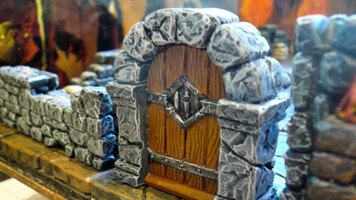 Gamer Forge Listener Email: Name Devin Patchery Comment Here's the situation. There's a locked door that prevents any further progress into the dungeon. There's a keyhole in the door and a message basically saying that the key needs to be wished for. In the room with the locked door is a wishing well. Each person is limited to one wish, and successive attempts just inflict damage to the wisher. It's very straightforward: someone needs to wish for the key and it will appear, and they can unlock the door. The intent was not to present the players with a complex puzzle or anything time-consuming. The intended effect was that all but one player get a free wish, but one person has to sacrifice their wish to get past the door (and later be rewarded for their selflessness). But, as always, things did not go according to plan. Without even discussing the key, each character went ahead and made their selfish wish. Okay, no big deal. You can brute force the door or just break it down with an axe. But my players are terrified that something awful will happen if they destroy the door, even though I have done nothing to indicate this. They've tried wishing for the key, but since they all expended their wish, the well just damages them and doesn't work. So they've now set their mind to solving this puzzle that doesn't exist. They are trying to find deeper meaning in the words on the door, trying to word the wish more precisely, taking unnecessary damage all the while. The last 30 minutes of our session was spent on this. Now I'm all for causing a little party frustration. But it's starting to drag on. I want to explain to them that they've simply exhausted their wishes and need to find an alternative way to get past the door. I want to smack the fighter over the head and tell him to just bash it down. But that's not the way I roll (heh, heh). I would provide subtle clues - the magic aura of the wishing well fades, or something along those lines, but the damage has already been done. They've inspected the well and the door and I've already told them that there is nothing different about it. How can I get my players to overcome this obstacle without just telling them outright? Gamer Forge Response: We love this situation! We really do! When players are stuck between a keyhole and a wishing well, DCR says: 1. Well, duh! You gave players a free wish. Was any other outcome truly expected? Indeed, the DCR Ten Commandments state: Thou shalt respect the consequences of thine actions. Your players were given an open invitation to solve this challenge and they squandered it. But let's go back a bit. No, it's not too much to expect that adventurers will have a few moments of altruism and selflessness. The outcome of this situation can help illustrate the importance of thinking beyond munchkin-ing out their character sheets. 2. A funny consequence may be to have another adventurer NPC walk out of the locked room holding some generic loot and show them what they missed out. Remember, that this is a moment of consequence, so they shouldn't even get an opportunity to mug the NPC and jank the loot, because that just bypasses the challenge. Also, don't get preachy about it. Once they see what they missed out on, just move on with the adventure. They won't hold it against you if you don't keep holding it against them. 3. The deep part: Does the rest of your adventure hinge on getting what's behind the door? There doesn't seem to be any reason why your story can't just move on somewhere else. Remain mindful, Dungeon Master, that you are running a game and are responsible for keeping things moving. If players make too much noise in the room, have something sneak up behind them and attack, or do something to get them moving along. *Bonus XP: Most films and books that deal with an apocalypse or some kind of global context as part of it's setting are a great place to start looking at how a barter system works. Mad Max, The Book of Eli, The Road, The Hunger Games, and District 9 are all settings that involve the use of a barter system. Just find your commodity and transplant it into your game's setting. To get a very real look at bartering, imagine what it would be like on a deserted island with the adventurers. Money loses value quickly while resources and small, everyday contrivances take over as the new gold. 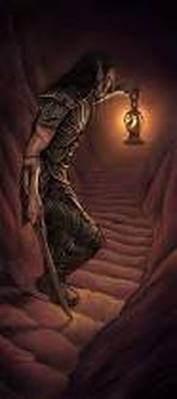 This week, since Revan deprived us of his company, the remaining three heroes decided to take a look at the basics of making a dungeon. When it comes to the very, very basics of building the better dungeon, DCR says: 1. What exactly is the scope of things? What does the dungeon look like with nobody inside it? Is it all made of brick and mortar? Is it rough-hewn stone. Is it in a cave? Is it made of wood? Does it have flowing lava everywhere? Firebird says it best, "Know your surroundings." This avoids the disjointed feeling players may get going from room to room. Make sure it's not constantly changing based on your mood. 2. What kind of challenge will this present? Try spacing out the difficult battles in between some smaller cronies and henchman. If every dungeon progresses in the "ladder formation", then players may start feeling the snooze fest. This is part of making the dungeon part of your living, breathing world. The creatures of this place don't just freeze when the heroes exit. They were doing what they were doing before the heroes decided to enter. This one little detail can make or break your game, as small details can keep players interested in what happens around them. Also, think of the flow of the dungeon like a house. Does it loop back into itself, like Skyrim? Does the cave come to a dead-end? Is it just a big warehouse? 3. Now you can worry about what enemies to put in. You've established the surroundings and context. You've established the map. The last detail is filling it with your enemies. Now it may be tempting to throw in everything the DM thinks is awesome, but don't rush! Just keep in mind what was in the room before. Don't have killer fish-men in the room right after a mutant bee-hive filled with lasers. If you want to have fish-men, just have other things appear in the dungeon that may appear with fish-men. Patience, patience, patience! *Bonus XP: To give your dungeon a bit of familiarity, play a game of classic Clue. Each of the rooms in the house has a certain context within the goal of the game. Sure, there aren't any monsters in the house, but there also aren't any inexplicable changes in scenery to throw players off. The whole scene is tied into the ultimate goal: solve the murder. Keep the players playing the same game together!  Gamer Forge Listener Email: Name Matthew Spencer Comment Hey DCR could you talk about this on your show? We are a small gaming group in Calgary and could use your insight. Also we just have to say we love the Ed & Double D special! So here is my question. How do I deal with overly cautious players? Recent encounters with hard to hurt opponents have left the party pretty beat up. Now the players are now seemingly scared by similar encounters and prefer fleeing. I'm GMing a game of Pathfinder for friends, using a premade module. They plays a team of four characters and it's been going great so far. Recently though, the group has started facing harder opponents with various immunities or high damage output. Result: the party has taken a beating but is still alive. My players confidence though? Went down for the count. The party had a series of encounters with creatures that displayed unusual powers and immunities. Some of them were more dangerous than I think the module intended, and others would have been less dangerous but the party didn't react the way the module expected (not least because they were spooked by the earlier dangerous encounters). The party also didn't get any mental breathing room by being given fights they could simply smash in between these more dangerous or unusual encounters. This resulted in the players quickly getting spooked, feeling like they were in over their head, and so we spent the session with the characters running away. It did not make for a fun session on either side. How do I reassure the players and make the fighting something to look forward to rather than a frustrating experience of hide and seek? Should I start adapting the scenario to manage the player's fear level and put a few easier encounters to show their party is not inept? Or should I push some tools that could help against those opponents? Sub-questions: • How do you reassure your players when a new encounter brings back an unexpected previous-encounter trauma? • How do you reconcile the fact the encounter is meant to be scary, is indeed scary to the players, but you suddenly wish it would not be? The issue has been discussed with the player right after the session since it was obvious we were both disappointed by these few hours. He admitted being gradually scared by multiple things: • A previous encounter with a creature which required spending more resources than usual to defeat. The problematic encounter is meant to look like that creature at first, so... trauma. • The description of the new creature (it is eerie and menacing in various ways) • The legend one of the PCs remembered, which seems linked to the creature (legendary creature?!) • The problematic encounter's secret true nature led to alarmingly unusual and apparent rule-breaking effects when the party didn't figure out the truth quickly. The player actually enjoys combat, quite possibly more than roleplaying encounters. He is not yet knowledgeable about all the tactical possibilities of the system though (nor am I, really). Gamer Forge Response: Holy guacamole! This one was a doozy! Its a bummer when your heroes get their day wrecked, but when it comes to climbing back on the saddle, DCR says: 1. It's okay to stroke their ego a little. That's the importance of henchman. Not every battle or conflict needs to be epic-sized. If "epic" is the norm, then what becomes the new "epic"? When the players are having a problem getting their confidence back, throw them a bone. Give them a battle or two with some puny goblins or something. But when you throw them a bone, DO NOT throw them a curve ball. If they find a five skeletons, then they find ONLY five skeletons. No swerves. What they see is what they get. The bridge of trust needs to rebuilt, and it won't happen if they don't trust the one responsible for telling where the bridge leads. 2. Introduce an NPC to accompany the heroes to give them a boost of confidence. But friends don't let friends play NPC's willy-nilly. An adventuring NPC should never outshine or outperform a player character in any statistical manner. The NPC is there to act as cheerleader, or worst case scenario, as training wheels. If the players grow attached to the hireling or henchman or whatever the NPC ends up being, just have it handling things non-specifically in the background. Let the players have the spotlight whenever possible. If you want to hire a mercenary or henchman to carry your adventure gear, remember that players should have to pay or share the spoils of battle, including experience. This opens the door for when the players wish to separate from the NPC by not letting them get too attached. On the other hand, if the players do get attached, they won't mind so much sharing the spoils and can be there to cheer on the players once the training wheels come back off. This is about getting their confidence back, after all. 3. Now, for the hard part. And we all three agreed that this one is tough. But some lessons need to be learned the hard way. If your players drew the conclusion that the creature was legendary because the words "legend" and "creature" appeared in the same sentence, then they deserve what happened. If the DM gave them ample chances and clues to keep them on a certain path, and they still arrived at that conclusion, then they deserve to be running. They bit the hand that fed them. But now that that part is over, now its time for both parties to move on and learn from the mistake. Hopefully, the players can take a hard, objective look at the problem and the outcome, and take back an experience of growth. And laughter. If you can't laugh after learning, then what was the point of learning anything? Bonus XP: For the penultimate NPC, look no further than Star Wars. C-3PO was annoying, eccentric, droll, and flat-out hated by fans. But there were a few moments where the heroes would not have succeeded without his help. Yet, he was out-classed physically by everyone else, including R2-D2. When it came time to fight, he scooted neatly into the background, and helped set the mood for the entire film franchise. He was endeared just enough to keep him around, and filled just the right niche when the time was just right. Most importantly, he was right beside the heroes during their greatest moments and welcomed them home, not do the work for them or take credit. Perfect. Simply perfect. 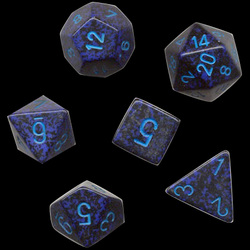 Gamer Forge Listener Email: Name: Steven Comments: I recently started DMing after playing 4th edition D&D around 10-15 times. While going over player and DM books I started to wonder if regeneration works while a PC is dying. For example, a level 2 fighter by the name of Korgul is down to -2 hit points. In the previous round he used Boundless Endurance. Since his modifier for the skill gives +2, that is a regeneration of +4. This would mean that he would get to 2 hit points at the start of his round and become conscious? Or does the regeneration stop? Well this turned into to 2 questions actually. First one is about regeneration and dying in general. Does dying count as bloodied in relation to Boundless Endurance. To me, as a DM, if regeneration worked while dying it would seem overpowered. Gamer Forge Response: DCR says: Regeneration does take effect after you fall below zero hit points. Most of the regeneration powers require you to spend an action of some kind to activate, so you must be conscious to use it. If the regeneration is in effect before the character falls, then it stays active while they are down. No need to deny what is rightfully won. BUT, keep in mind that death saving throws must still be taken when a character falls below zero hit points, as usual. In short, regeneration is fair game. Gamer Forge Listener Email: Name: Richard Besley Comments: When I first started playing with a group of completely new players, one of the first things I did was to explain the alignments as best I could at the time. When describing Chaotic Neutral, my exact words were, "A chaotic neutral character will do whatever he wants to do, so long as there is a reason that is justifiable to at least him behind doing so." Well, recently, I'm beginning to think that that explanation is not exactly accurate, or at least not perfectly clear. To explain, through every game I have played with this group, I have regretted each and every time I allowed a player to play a chaotic neutral character. The exact same thing will happen, no matter how many times I explain why it shouldn't. Said character will, for no reason I can fathom other than because his player (and by extension the character itself) wants to. Anything from using a squirrel to test out a new spell, to burning down the local pub to stop the flow of polluted beer, to openly mocking authority figures until nothing short of character death is put on the table, and even then only because I made the desire for self-preservation a required character trait. This is not to say that they do this because they prefer to, or that it's simply a style of play that they find more fun. We've played campaigns where I banned chaotic-neutral alignment, and everyone enjoyed themselves without this being an issue. It's simply that, whenever this issue comes up, I'll point it out to them and they'll reply with some variant of, 'I'm a chaotic character, and I'm being chaotic. Why is that wrong?" I don't have an answer to that. So, what's a better way to describe a chaotic neutral character? How do I explain to this group that, even if the alignment is 'chaotic,' that doesn't mean they have to play either chaotic-stupid, or insane? Gamer Forge Response: DCR says: Your alignment isn't like the alignment on your car! These things can change and shift like the winds. When it comes to not making your character "Chaotic Stupid", DCR says: 1. What defines chaos and neutrality, and what happens when you combine the two? "Chaotic Neutral", as defined by Dungeons and Dragons, states that chaos must balance the scale between good and evil, without preference to either one. This is much easier than it sounds. Being unpredictable is only small part of the big picture. The end result should be something along the lines of everything balancing out, and neither side is ahead. That's the real problem. "Chaotic Neutral" involves nobody truly getting ahead in anything. 2. Motivation! Alignment is a motivation, not a justification. It's about the start of the action, not the end. Your character's alignment is never a reason to commit a good or evil act. If the character is already bent on burning down an orphanage, he/she is gonna do it. But this also means that the character is already evil. We say that an alignment can change as soon as your GM decides that your motivations are clear. If you are hell-bent on being "Chaotic Neutral", be aware that that can change just as easily as your actions do. 3. You are an outsider! As "Chaotic Neutral", you will be extremely hard to deal with, professionally and personally. Your shifting attitudes and actions will make you hard to pin down and even harder to rely on. That's just it: you will ultimately be unreliable! Nobody will want to count on you. So what's the point of even playing? You may as well be playing a computer game. Sadly, this is where being this alignment hits a dead end. We say that it's best to just steer clear of "Chaotic Neutral". Alternately, just do away with alignments all together. Bonus XP: Jeff "The Dude" Lebowski. That's the only real exemplar of "Chaotic Neutral" we can think of. Which absolutely proves the point that this alignment is unreliable. Funny? Yes. Adventure? Not at all. At best, he is motivated by laziness and keeping Walter off his back. Remember this the next time you decide to pop that movie into your DVD or Blu-Ray player. 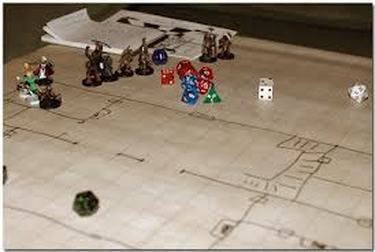 Gamer Forger Listener Email: Name: Javik Comments: I apologize beforehand if this question has been asked before, I was not able to find one, except this, which may be related: Dealing with players who try to run from everything?. Also I'd like to note that english is not my native tongue, so please be gentle. The problem I have a player in my group which tends to approach local authorities (may it be guards or churches) when facing a threat. He thinks that, given his role (a bard in a medieval world, so, more or a less, a civilian), this is what one of his kind would do in such situations. The other characters, more powerful (knight, ranger, sorcerer, ...), are the passive kind of players and do not prevent him from doing that. While this behavior is not unjustified, the whole point of playing the game is to solve problems on your own (IMHO), even if they seem to be overwhelming. Sometimes it is justified, but most of the time it makes things only more complicated in terms of: •The storyline, like the one time they faced a single undead raised by a curse in a city at night, where he handed over the ring which has caused the curse to the local temple, instead of trying to find out about the origins of the curse and how to break it. As soon they have found out that the curse has not been broken and it only affects a certain party member, the required ring was out of reach ... ooops, now they are in trouble (including the storyline). •The threat level, because the encounters have to be extended, so that they are a threat to a group of adventures AND a bunch of guardsmen. One time the same player in another group abandoned the whole group for a 14 days travel to contact a befriended inquisitor about a serious evil thread to get the support of a bunch of knights. The examples above are presented in a more superficial way than they actually are. The true story behind is way more complicated, including aspects of personal motivation. I could tell the player to stop doing that, but I'd prefer to solve the issue in the game, without overstretching means like: •Authorities are too ignorant/busy/incompetent to care (which in the long run will seem like all authorities in the world are essentially only decoration) •The adventure is happening in a "closed" environment like extreme wilderness, a ship on the ocean, an area locked because of a plague etc. The question What can I do ? How do you deal with such behavior ? Gamer Forger Response: This one was a long question, but we got your solution in one neat, tidy packet! Your party needs a spoony bard, and here's some good reasons why you should keep doing it. But being a bard ain't easy. When it comes to really confusing situations with your bardy-bard, DCR says: 1. Bards aren't really fighters, anyway. Not fighting is just as legit as getting your hands dirty. Indeed, the concept of "bard" was never intended to be a heavy damage dealer. They were meant to supplement the others in their duties and function as spokesman for the party. Playing a coward is just as valid as playing a fearless barbarian. There's no need to encounter the pressure of others to behave as they do. Other players should worry about how they play, not how others do. 2. You've encountered the consequences of your actions, now you get to deal with it. Not much else to say about that. Running away is just as good, but there's still consequences. No matter what you do, this will always be the case. Ain't no running away from your fate. 3. Talking is your job. If you're not feeling up to snuff keeping up with the "tanks" and "casters", maybe "bard" isn't the right choice for you. Nothing wrong with that. The classes were created to have distinct strengths and were meant to played to those strengths. Frankly, it's best and easiest to say that it's time to consider trying a different character class. There's no shame in realizing you may be wrong. Just remember to handle that gracefully, please. Firebird suggests that you ask "What do I want to play today?" Think of how you like to do things. *Bonus XP: When running and/or playing any tabletop RPG: Everything is a variable. Never count on players behaving a certain way. Never count on a GM to behave a certain way. You may no always be comfortable being outclassed or overmatched, but you must be okay with the circle of life. Just because you see a mountain, doesn't necessarily mean you have to be the one who climbs it. Its just a mountain. Remember to listen to the complete Gamer Forge segment each week during the "live" broadcast from Epic Puzzles and Games in West Valley City, Utah every Monday from 6-8 pm MST. If you have issues or questions in your game, contact DCR to help level up your game at [email protected]! |
The GamerForge is DungeonCrawlersRadio’s most favoritist segment of the entire show. Have you ever had a boggling rules question that no one in the group can figure out? Write in to us and we’ll help try to solve it! Are you a Game/Dungeon Master who needs help squashing animosity at the table or dissension in the ranks? Perhaps we can help!
If you are in need of help, encouragement, or an uber devious way to get a TPK, we are here to help. No matter your needs, we’ll help you get more from your gaming! The Gamer ForgeWhere Players & Game Masters can come for valuable information to level up your game! Archives
August 2013
Categories
All
|





 RSS Feed
RSS Feed








